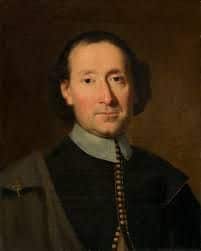
Adriaen Van der Donck, the founding father of Yonkers
By Mary Hoar, President Emerita Yonkers Historical Society, recipient of the 2004 Key to History and President Untermyer Performing Arts Council
Monday July 18th
July 18, 1950: The Yonkers Board of Education hired Willieanna Crier, the third regularly appointed African American teacher, to be an elementary teacher at School Six. Miss Crier, who had her BS from Hampton Institute and a Masters in Education from Columbia, came from a distinguished family. Her father, Colonel Douglas Crier, served our country during WWI and WW II; during his second round of service, he was appointed commander of the 23rd Internal Security Battalion. Afterwards, he worked in Yonkers City Court, and served as President of the NAACP.
Tuesday, July 19th
July 19, 1926: Eileen O’Mara of the Yonkers Women’s Swimming Association, shattered the record for the 110-yard Backstroke in a state meet at Babcock Lake in Hoosick Falls. Her time of 1:32 broke the mark set by Ethelda Bleibtrey at Manhattan Beach in 1919 by more than 1 second. Eileen was the sister of swimming star Doris O’Mara.
July 19, 1947: Councilman Edith Welty suggested the Republican City Executive Committee not endorse her for the coming election. Why? Because of “certain requests for patronage for which I manifested an unsympathetic attitude.”
Wednesday, July 20th
July 20, 1912: School Superintendent Charles Gorton laid the blame for students’ lack of spelling ability at the feet of their mothers. He said mothers were too eager to have their children “excel in special lines and are overlooking the necessary rudimentary training the means so much for the all-around development of boys and girls.” He believed less time should be spent teaching music, arts and manual training.
July 20, 1927: After fighting for close to two years. Thomas Lyons of Warburton Avenue was awarded $3200 for the loss of his eye while working for Yonkers; the award, originally handed down May 1926, had been appealed by Yonkers. The next step, according to attorney Harry Laragh, was to sue for the interest on the award garnered while Yonkers was appealing.
Thursday, July 21st
July 21, 1907: Governor Charles Evans Hughes signed two bills affecting Yonkers. The first was an act prohibiting building elevated structures on Riverdale Avenue and South Broadway; the second authorized Yonkers to grant the New York Central Railroad land for “railroad purposes.”
July 21, 1924: Sisters Frieda and Elsa Schlobohm of Warburton Avenue, returning from Maine, were passengers on the Steamship Boston when it was rammed in a dense fog by the tanker Swift Arrow off Point Judith, RI. The tanker was lightly damaged and assisted in the rescue efforts. The liner held more than 1,000 passengers and a crew of 180; four people lost their lives. The Schlobohm sisters escaped the ship in a leaky lifeboat, one that was missing its rain plug; they and their fellow passengers bailed waiter desperately for two hours to keep the craft from sinking until they were picked up by a steamer. The girls arrived back in Yonkers safely two days later.
Friday, July 22nd
July 22, 1918: the Honorable Charles S. Whitman, Governor of New York, spoke at the Warburton Theater. All Yonkers citizens were invited to hear him discuss State issues, and listen to entertainment by noted local singer Harold Land.
July 22, 1927: Water Bureau Superintendent James Curran had a personal run-in with an adventurous local fish. The mischievous creature decided to go exploring and left the Grassy Sprain Reservoir to travel through Yonkers water mains. Unfortunately for Curran, he ended up in his home system, costing the Superintendent $188 for repairs to this plumbing.
Saturday, July 23rd
July 23, 1910: Thomas Broadbent of 15 North Broadway was presented the King’s Medal by the British Government for rescuing 3 sailors on the trading steamer Fantel, off Cape Palmes, Liberia. The Fantel was wrecked on a sunken rock, and the crew worked for four days and nights to prevent the hold from being totally filled with water. Part of the crew mutinied; local pirates tried to take over the ship for its cargo but were repelled by the sailors’ revolvers. On the 4th day, six crewmembers were overcome in the hold by gas. Broadbent volunteered to rescue them, was lowered into the hold and brought up 3 sailors. Unfortunately, in trying to recover other crewmembers, Broadbent was overcome himself, and did not revive for 5 days. It was his second medal from the British government, the first awarded for bravery several years earlier.
July 23, 1931: Well known contractor George T. Kelly of North Broadway was a judge for the Mickey Walker-Jack Sharkey fight at Ebbets Field in Brooklyn. The fight ended in a draw; Kelly voted for Sharkey and noted referee Arthur Donovan voted for Sharkey. The third judge, Charles Mathison, said the fight was a draw.
Sunday, July 24th
July 24, 1653: Yonkers’ founder Adraien Van der Donck, who received his law degree in the University of Leyden and had been admitted to practice before the Supreme Court of Holland, received permission to practice law in New Netherlands, the first lawyer in America!
July 24, 1925: Wilma Ansell of Nepperhan Avenue was chosen “Miss Yonkers of 1925” at the annual beauty contest sponsored by American Legion Post 7. Held at the Strand Theater, contest judges were Sidney Riesenberg, Robert Huntington, Charles Louis Hinton, David Hutchinson and Mrs. O. W. Kalkhof.
Questions or comments? Email YonkersHistory1646@gmail.com.
For information on the Yonkers Historical Society, Sherwood House and upcoming events, please visit our website www.yonkershistoricalsociety.org, call 914-961-8940 or email yhsociety@aol.com.





